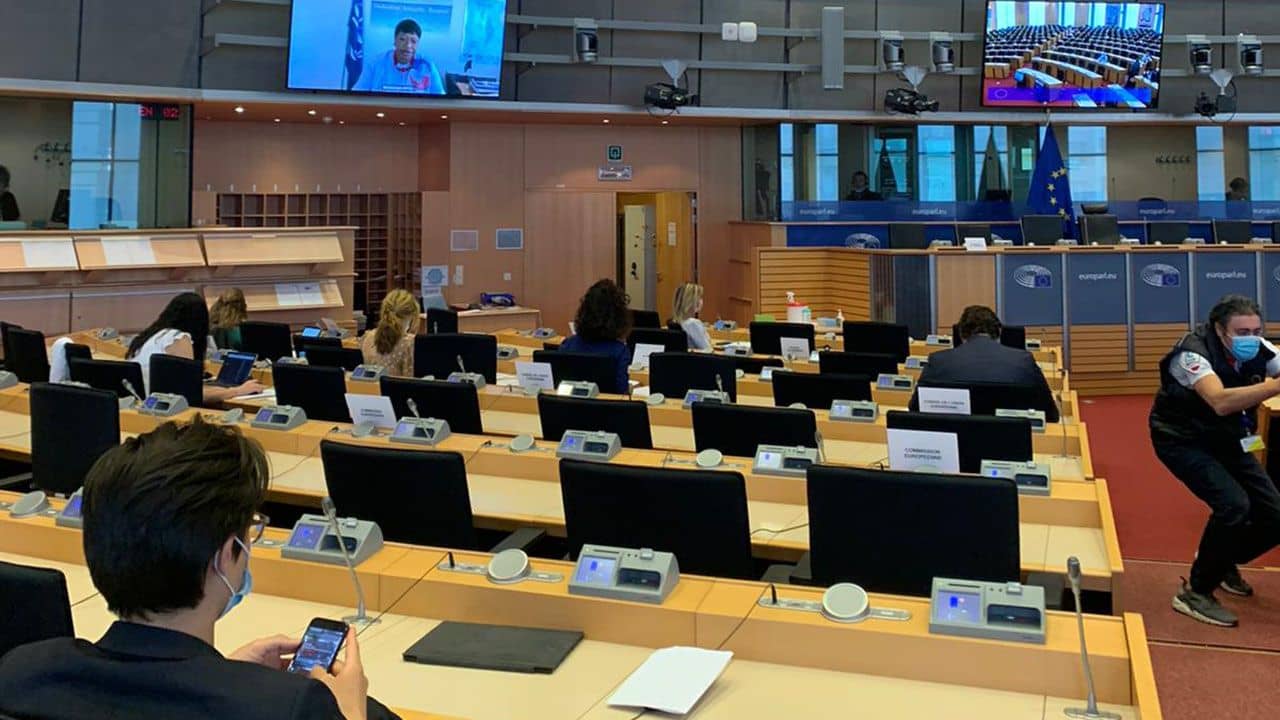
Brussels/The Hague
Triggered by an initial proposal of PGA, the European Parliament’s Subcommittee on Human Rights held on 29 May 2020 an exchange of views with the International Criminal Court (ICC) Prosecutor, Ms. Fatou Bensouda, marking the 9th (and final) year of her non-renewable mandate.
Chaired by Ms. Maria Arena, MEP (Belgium), the session was opened by a presentation of the ICC Prosecutor, followed by the forceful statements of three PGA Members: European Parliament Vice-Presidents Ms. Heidi Hautala (MEP, Finland) and Mr. Fabio Massimo Castaldo (MEP, Italy); and the Chair of the Justice and Civil Liberties Committee, Mr. Miguel Lopez Aguilar (MEP, Spain). An additional 17 MEPs from across the political spectrum intervened, with pointed questions to the ICC Prosecutor. This included PGA Members, Mr. Ivan Štefanec (MEP, Slovakia), who spoke on behalf of the largest political group in the Parliament, the European People’s Party; and Dr. Hannah Neumann (MEP, Germany).
MEPs expressed strong support for the mandate of the ICC and reaffirmed the commitment of the European Union to stand with the ICC against political attacks aimed at exerting pressure against the independence of the its proceedings.
Summary of key issues discussed:
1) ATTACKS AGAINST THE ICC
In the face of the potential exercise of the Court's jurisdiction in the situations of Palestine and Afghanistan, the Prosecutor described the most recent wave of attacks against the integrity of the Rome Statute and against members of the Office of the Prosecutor. She clarified that such attacks are based on false information and are aimed at influencing the independent and impartial exercise of her prosecutorial mandate under the Rome Statute.
MEPs across political groups expressed unwavering support for the Rome Statute system and the independent exercise of the prosecutorial and judicial functions that the Rome Statute attributes to ICC organs. Several MEPs expressed concerns that the threats against the ICC not only stem from dictatorships and oppressive regimes, but also from liberal democracies. Inquiring as to which measures taken by the EU would be most efficient to combat this phenomenon, they emphasised that the political support for the ICC by the EU and its Member States must strategically increase.
2) RESOURCES AND CAPACITY
MEPs called for renewed investment in the fight against impunity and asked the ICC Prosecutor for her assessment of the amount of human and financial resources necessary to augment the performance of the Court in terms of the number of cases against alleged perpetrators of international crimes as well as the capacity to address the “smear campaign” against the ICC.
European Parliament Vice-President Castaldo recalled the definition of the "no-impunity principle" adopted by the EU Council in 2002 to confront attacks against the Rome Statute system, and emphasized the importance of the Independent Expert Review process chaired by Judge Richard Goldstone, which may propose strategic reforms to enhance the capacity and performance of all ICC organs.
Vice-President Hautala highlighted the judicial nature of the ICC and asked whether States should move the funding of the ICC from International Organizations' budget-line to their Justice and the Rule of Law budget. Such a change would render the resources of the ICC much more adaptable to the real needs of the Office of the Prosecutor, especially in light of the developments of crime waves on the ground as well as the advancement of OTP investigations.
The Prosecutor, welcoming the questions, called on the EU Member States to publicly support the increase of the Court’s budget to reflect the potential increase of the number of situations and new cases in the years to come.
3) ICC SITUATIONS AND CASES
In her presentation, the Prosecutor reviewed the status of situations under preliminary examinations and investigations, as well as the developments of on- going trials.
The Prosecutor addressed the situation in Darfur/ Sudan. She underscored that the recent announcements by transitional authorities concerning the surrender to the ICC of the arrested former President al- Bashir have not been followed by any official communication to the ICC. The Covid-19 emergency further exacerbates delays on such communication. Prosecutor Bensouda reminded the European Parliamentarians that there are five pending arrest warrants for genocide, crimes against humanity and/ or war crimes against Sudanese nationals, and called for a determined EU action to prompt the fulfilment by Sudan of its international obligations.
MEPs made informed comments and posed challenging questions on the on-going situations in Afghanistan, Colombia, Iraq/ UK, Palestine, Libya, Venezuela and Ukraine, as well as on topical issues such as the Prosecutor’s focus on investigating environmental crimes and the situation of migrants in the Mediterranean Sea. Some comments and questions also referred to situations falling outside the territorial jurisdiction of the Rome Statute, such as Syria, regarding which several proceedings have been undertaken by EU Member States on the basis of the principle of extra-territorial or universal jurisdiction.
On Palestine, the Prosecutor, while stressing that the issue of the territorial jurisdiction is pending before the Pre-Trial Chamber which prevents her from commenting on the situation further, emphasized the absolute impartiality that her Office is applying when assessing the alleged crimes committed by all parties to the conflict.
On Libya, the Prosecutor spoke about the preparation of additional arrest warrants, in respect of the atrocities committed in the on-going armed conflict. She referred to her recent briefing at the UNSC, noting that three arrest warrants are still pending with the effective authorities - including the State of Egypt and the de facto entity in Libya led by General Haftar – which have so far failed to cooperate with the ICC.



